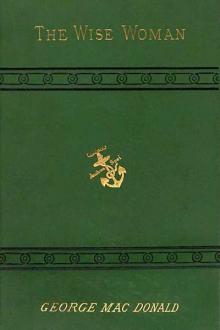The Wise Woman - George MacDonald (good books for high schoolers .txt) 📗

- Author: George MacDonald
- Performer: -
Book online «The Wise Woman - George MacDonald (good books for high schoolers .txt) 📗». Author George MacDonald
When she reached the valley, she followed the course of the stream, knowing only that it would lead her away from the hill where the sheep fed, into richer lands where were farms and cattle. Rounding one of the roots of the hill, she saw before her a poor woman walking slowly along the road with a burden of heather upon her back, and presently passed her, but had gone only a few paces farther when she heard her calling after her in a kind old voice—
“Your shoe-tie is loose, my child.”
But Rosamond was growing tired, for her foot had become painful, and so she was cross, and neither returned answer, nor paid heed to the warning. For when we are cross, all our other faults grow busy, and poke up their ugly heads like maggots, and the princess’s old dislike to doing anything that came to her with the least air of advice about it returned in full force.
“My child,” said the woman again, “if you don’t fasten your shoe-tie, it will make you fall.”
“Mind your own business,” said Rosamond, without even turning her head, and had not gone more than three steps when she fell flat on her face on the path. She tried to get up, but the effort forced from her a scream, for she had sprained the ankle of the foot that was already lame.
The old woman was by her side instantly.
“Where are you hurt, child?” she asked, throwing down her burden and kneeling beside her.
“Go away,” screamed Rosamond. “You made me fall, you bad woman!”
The woman made no reply, but began to feel her joints, and soon discovered the sprain. Then, in spite of Rosamond’s abuse, and the violent pushes and even kicks she gave her, she took the hurt ankle in her hands, and stroked and pressed it, gently kneading it, as it were, with her thumbs, as if coaxing every particle of the muscles into its right place. Nor had she done so long before Rosamond lay still. At length she ceased, and said:—
“Now, my child, you may get up.”
“I can’t get up, and I’m not your child,” cried Rosamond. “Go away.”
Without another word the woman left her, took up her burden, and continued her journey.
In a little while Rosamond tried to get up, and not only succeeded, but found she could walk, and, indeed, presently discovered that her ankle and foot also were now perfectly well.
“I wasn’t much hurt after all,” she said to herself, nor sent a single grateful thought after the poor woman, whom she speedily passed once more upon the road without even a greeting.
Late in the afternoon she came to a spot where the path divided into two, and was taking the one she liked the look of better, when she started at the sound of the poor woman’s voice, whom she thought she had left far behind, again calling her. She looked round, and there she was, toiling under her load of heather as before.
“You are taking the wrong turn, child,” she cried.
“How can you tell that?” said Rosamond. “You know nothing about where I want to go.”
“I know that road will take you where you don’t want to go,” said the woman.
“I shall know when I get there, then,” returned Rosamond, “and no thanks to you.”
She set off running. The woman took the other path, and was soon out of sight.
By and by, Rosamond found herself in the midst of a peat-moss—a flat, lonely, dismal, black country. She thought, however, that the road would soon lead her across to the other side of it among the farms, and went on without anxiety. But the stream, which had hitherto been her guide, had now vanished; and when it began to grow dark, Rosamond found that she could no longer distinguish the track. She turned, therefore, but only to find that the same darkness covered it behind as well as before. Still she made the attempt to go back by keeping as direct a line as she could, for the path was straight as an arrow. But she could not see enough even to start her in a line, and she had not gone far before she found herself hemmed in, apparently on every side, by ditches and pools of black, dismal, slimy water. And now it was so dark that she could see nothing more than the gleam of a bit of clear sky now and then in the water. Again and again she stepped kneedeep in black mud, and once tumbled down in the shallow edge of a terrible pool; after which she gave up the attempt to escape the meshes of the watery net, stood still, and began to cry bitterly, despairingly. She saw now that her unreasonable anger had made her foolish as well as rude, and felt that she was justly punished for her wickedness to the poor woman who had been so friendly to her. What would Prince think of her, if he knew? She cast herself on the ground, hungry, and cold, and weary.
Presently, she thought she saw long creatures come heaving out of the black pools. A toad jumped upon her, and she shrieked, and sprang to her feet, and would have run away headlong, when she spied in the distance a faint glimmer. She thought it was a Will-o’-the-wisp. What could he be after? Was he looking for her? She dared not run, lest he should see and pounce upon her. The light came nearer, and grew brighter and larger. Plainly, the little fiend was looking for her—he would torment her. After many twistings and turnings among the pools, it came straight towards her, and she would have shrieked, but that terror made her dumb.
It came nearer and nearer, and lo! it was borne by a dark figure, with a burden on its back: it was the poor woman, and no demon, that was looking for her! She gave a scream of joy, fell down weeping at her feet, and clasped her knees. Then the poor woman threw away her burden, laid down her lantern, took the princess up in her arms, folded her cloak around her, and having taken up her lantern again, carried her slowly and carefully through the midst of the black pools, winding hither and thither. All night long she carried her thus, slowly and wearily, until at length the darkness grew a little thinner, an uncertain hint of light came from the east, and the poor woman, stopping on the brow of a little hill, opened her cloak, and set the princess down.
“I can carry you no farther,” she said. “Sit there on the grass till the light comes. I will stand here by you.”
Rosamond had been asleep. Now she rubbed her eyes and looked, but it was too dark to see anything more than that there was a sky over her head. Slowly the light grew, until she could see the form of the poor woman standing in front of her; and as it went on growing, she began to think she had seen her somewhere before, till all at once she thought of the wise woman, and saw it must be she. Then she was so ashamed that she bent down her head, and could look at her no longer. But the poor woman spoke, and the voice was that of the wise woman, and every word went deep into the heart of the princess.
“Rosamond,” she said, “all this time, ever since I carried you from your father’s palace, I have been doing what I could to make you a lovely creature: ask yourself how far I have succeeded.”
All her past story, since she found herself first under the wise woman’s cloak, arose, and glided past the inner eyes of the princess, and she saw, and in a measure understood it all. But she sat with her eyes on the ground, and made no sign.
Then said the wise woman:—
“Below there is the forest which surrounds my house. I am going home. If you please to come there to me, I will help you, in a way I could not do now, to be good and lovely. I will wait you there all day, but if you start at once, you may be there long before noon. I shall have your breakfast waiting for you. One thing more: the beasts have not yet all gone home to their holes; but I give you my word, not one will touch you so long as you keep coming nearer to my house.”
She ceased. Rosamond sat waiting to hear something more; but nothing came. She looked up; she was alone.
Alone once more! Always being left alone, because she would not yield to what was right! Oh, how safe she had felt under the wise woman’s cloak! She had indeed been good to her, and she had in return behaved like one of the hy�nas of the awful wood! What a wonderful house it was she lived in! And again all her own story came up into her brain from her repentant heart.
“Why didn’t she take me with her?” she said. “I would have gone gladly.” And she wept. But her own conscience told her that, in the very middle of her shame and desire to be good, she had returned no answer to the words of the wise woman; she had sat like a tree-stump, and done nothing. She tried to say there was nothing to be done; but she knew at once that she could have told the wise woman she had been very wicked, and asked her to take her with her. Now there was nothing to be done.
“Nothing to be done!” said her conscience. “Cannot you rise, and walk down the hill, and through the wood?”
“But the wild beasts!”
“There it is! You don’t believe the wise woman yet! Did she not tell you the beasts would not touch you?”
“But they are so horrid!”
“Yes, they are; but it would be far better to be eaten up alive by them than live on such a worthless creature as you are. Why, you’re not fit to be thought about by any but bad ugly creatures.” This was how herself talked to her.
CHAPTER XII.
All at once she jumped to her feet, and ran at full speed down the hill and into the wood. She heard howlings and yellings on all sides of her, but she ran straight on, as near as she could judge. Her spirits rose as she ran. Suddenly she saw before her, in the dusk of the thick wood, a group of some dozen wolves and hy�nas, standing all together right in her way, with their green eyes fixed upon her staring. She faltered one step, then bethought her of what the wise woman had promised, and keeping straight on, dashed right into the middle of them. They fled howling, as if she had struck them with fire. She was no more afraid after that, and ere the sun was up she was out of the wood and upon the heath, which no bad thing could step upon and live. With the first peep of the sun above the horizon, she saw the little cottage before her, and ran as fast as she could run towards it. When she came near it, she saw that the door was open, and ran straight into the outstretched arms of the





Comments (0)